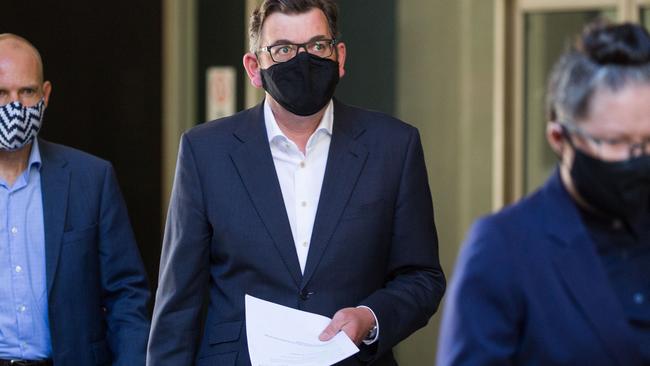Coronavirus: Masks on way out in Victoria, but only outside
Victorians are set for a reprieve from compulsory mask-wearing in outdoor settings where they are away from other people.

Victorians are set for a reprieve from compulsory mask-wearing in outdoor settings where they are away from other people, after Premier Daniel Andrews flagged a relaxation of the policy.
Currently, Victorians can be fined $200 if they are not wearing masks while outside their homes, but Mr Andrews indicated a planned announcement on Sunday on relaxing coronavirus restrictions was likely to include an easing of mask rules.
However, on Wednesday the Premier indicated that the wearing of masks in indoor settings and crowded locations was likely to continue, despite Victoria reaching 19 straight days with no new coronavirus cases.
“I think on Sunday you’ll see some changes to mask policy,” he said. “That’ll be principally, I think, where you’re outside and you’re away from others.
“I’ll put it to you this way: no one enjoys wearing a mask, and no one enjoys them as the weather gets warmer. However, for a very small inconvenience, there is a very large benefit.
“They won’t be here forever. They won’t be a feature of our public health response for all of next year, for instance, but for so long as they’re serving a purpose, then they’ll be part of our rules.”
Mr Andrews made the comments as he visited the King Valley in northeast Victoria’s to announce the funding of 120,000 $200 vouchers to encourage visits to regional Victoria, as part of a $465m tourism recovery package included in next Tuesday’s state budget.
The package comes after many tourism businesses, devastated by bushfires last summer, had no visitors for much of the year due to COVID restrictions.
Victorians will be able to apply for the vouchers conditional on spending at least $400 on accommodation, attractions or tours in regional Victoria.
Tourism Minister Martin Pakula said the details of how the scheme would work were yet to be finalised, but it was expected to operate in a similar manner to comparable schemes in Tasmania and South Australia.
Another $149m would go to visitor accommodation, improving significant tourist trails, and campaigns to encourage visits to local food and wine businesses.




To join the conversation, please log in. Don't have an account? Register
Join the conversation, you are commenting as Logout